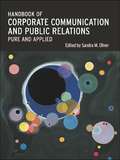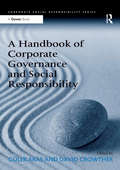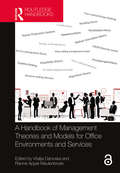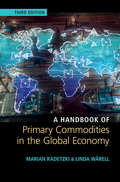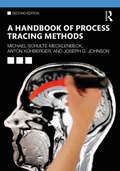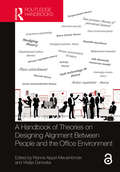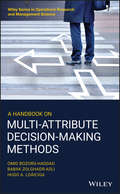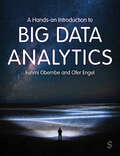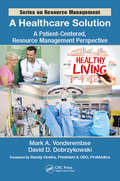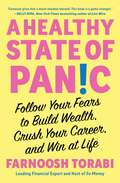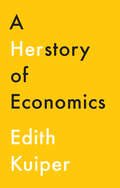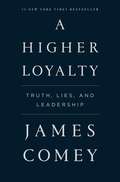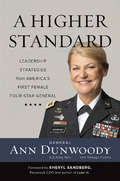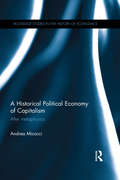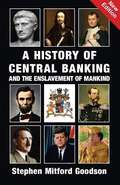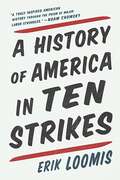- Table View
- List View
A Handbook of Corporate Communication and Public Relations: Pure And Applied
by Sandra M. OliverA bold addition to existing literature, this book provides an excellent overview of corporate communication. Taking an interdisciplinary approach, it offers readers the in-depth analysis required to truly understand corporate communication, corporate strategy and corporate affairs as well as the relevant public relations issues.With a refreshing ne
A Handbook of Corporate Governance and Social Responsibility (Corporate Social Responsibility)
by Güler ArasThe current economic situation has highlighted deficiencies in corporate governance while also showing the importance of stakeholder relations. It has also raised the profile of the debates regarding corporate social responsibility and shown the inter-relationship with governance. And the two together are essential for sustainable business. The social and environmental contexts of business are generally considered to be as significant as the economic and financial contexts and good governance will address all of these aspects. The combination of these aspects offers long term benefits for a firm, such as reducing risk and attracting new investors, shareholders and more equity as well as sustainable performance. Written by experts from all over the world, A Handbook of Corporate Governance and Social Responsibility is the most authoritative single-volume guide to the relationship between good governance and social responsibility and the reality of managing both. In addition to the theory and practice of governance and CSR, the book includes case studies from large and small organizations and NGOs to highlight examples of good and bad practice, and to show international and cultural similarities and differences while at the same time furthering the debate regarding the relationship between good governance and social responsibility.
A Handbook of Management Theories and Models for Office Environments and Services
by Rianne Appel-Meulenbroek Vitalija DanivskaAlthough workplace design and management are gaining more and more attention from modern organizations, workplace research is still very fragmented and spread across multiple disciplines in academia. There are several books on the market related to workplaces, facility management (FM), and corporate real estate management (CREM) disciplines, but few open up a theoretical and practical discussion across multiple theories from different disciplines. Therefore, workplace researchers are not aware of all the angles from which workplace management and effects of workplace design on employees has been or could be studied. A lot of knowledge is lost between disciplines, and sadly, many insights do not reach workplace managers in practice. Therefore, this new book series is started by associate professor Rianne Appel-Meulenbroek (Eindhoven University of Technology, the Netherlands) and postdoc researcher Vitalija Danivska (Aalto University, Finland) as editors, published by Routledge. It is titled ‘Transdisciplinary Workplace Research and Management’ because it bundles important research insights from different disciplinary fields and shows its relevance for both academic workplace research and workplace management in practice. The books will address the complexity of the transdisciplinary angle necessary to solve ongoing workplace-related issues in practice, such as knowledge worker productivity, office use, and more strategic management. In addition, the editors work towards further collaboration and integration of the necessary disciplines for further development of the workplace field in research and in practice. This book series is relevant for workplace experts both in academia and industry. This second book in the series focuses on the role of workplace management in the organization and the tasks that workplace management needs to consider. The 18 theories that are presented in this book and applied to workplace research discuss management aspects from the organization’s perspective or dive deeper into issues related to people and/or building management. They all emphasize that workplace management is a complex matter that requires more strategic attention in order to add value for various stakeholders. The final chapter of the book describes a first step towards integrating the presented theories into an interdisciplinary framework for developing a grand workplace management theory.
A Handbook of Primary Commodities in the Global Economy
by Marian Radetzki Linda WårellThe 2010s have been a dramatic period for most primary commodity markets. Producers suffered heavily as prices fell in response to new supply facilities going into production, juxtaposed against disappointing demand evolution from China in particular, marking the end of the most powerful and enduring commodity boom since the Second World War. This book is a guide to the primary commodity universe, an increasingly crucial part of the world economy. In this updated edition, Marian Radetzki and Linda W#65533;rell introduce and explain pertinent issues surrounding international commodity markets, including the importance of fossil markets among commodities, price formation, price trends, the shift in primary commodity consumption towards Asia, the increasing reliance on commodity exchanges, new relaxed attitude towards depletion, cartel action, and the revival of nationalism and state ownership. This is an accessible read for graduates, academic researchers, and professionals in the mineral and energy sectors.
A Handbook of Primary Commodities in the Global Economy
by Marian Radetzki Linda WårellThe dramatic price falls of 2014–2015 marked the end of the most powerful and enduring commodity boom since the Second World War. Now in its third edition, this book acts as a guide to the ins and outs of the primary commodity universe. Updates to this edition reflect on the consequences of both China's economic slowdown as its industrialization enters a new, less commodity demanding phase, and changes in the USA's trade policy under the Trump administration. Additionally, this edition takes into account recent developments in world oil markets and examines the effects of increased climate concerns. The authors introduce and explain pertinent issues surrounding international commodity markets such as the global geography of raw materials, price formation, price trends, the role of commodity exchanges, the threat of depletion, cartel action, state ownership, emerging commodity nationalism and more.
A Handbook of Process Tracing Methods: 2nd Edition (The Society for Judgment and Decision Making Series)
by Michael Schulte-Mecklenbeck Anton Kuehberger Joseph G. JohnsonA Handbook of Process Tracing Methods demonstrates how to better understand decision outcomes by studying decision processes, through the introduction of a number of exciting techniques. Decades of research have identified numerous idiosyncrasies in human decision behavior, but some of the most recent advances in the scientific study of decision making involve the development of sophisticated methods for understanding decision process—known as process tracing. In this volume, leading experts discuss the application of these methods and focus on the best practices for using some of the more popular techniques, discussing how to incorporate them into formal decision models. This edition has been expanded and thoroughly updated throughout, and now includes new chapters on mouse tracking, protocol analysis, neurocognitive methods, the measurement of valuation, as well as an overview of important software packages. The volume not only surveys cutting-edge research to illustrate the great variety in process tracing techniques, but also serves as a tutorial for how the novice researcher might implement these methods. A Handbook of Process Tracing Methods will be an essential read for all students and researchers of decision making.
A Handbook of Theories on Designing Alignment Between People and the Office Environment
by Rianne Appel-Meulenbroek; Vitalija DanivskaAlthough workplace design and management are gaining more and more attention from modern organizations, workplace research is still very fragmented and spread across multiple disciplines in academia. There are several books on the market related to workplaces, facility management (FM), and corporate real estate management (CREM) disciplines, but few open up a theoretical and practical discussion across multiple theories from different fields of studies. Therefore, workplace researchers are not aware of all the angles from which workplace management and effects of workplace design on employees has been or could be studied. A lot of knowledge is lost between disciplines, and sadly, many insights do not reach workplace managers in practice. Therefore, this new book series is started by associate professor Rianne Appel-Meulenbroek (Eindhoven University of Technology, the Netherlands) and postdoc researcher Vitalija Danivska (Aalto University, Finland) as editors, published by Routledge. It is titled ‘Transdisciplinary Workplace Research and Management’ because it bundles important research insights from different disciplinary fields and shows its relevance for both academic workplace research and workplace management in practice. The books will address the complexity of the transdisciplinary angle necessary to solve ongoing workplace-related issues in practice, such as knowledge worker productivity, office use, and more strategic workplace management. In addition, the editors work towards further collaboration and integration of the necessary disciplines for further development of the workplace field in research and in practice. This book series is relevant for workplace experts both in academia and industry. This first book in the series focuses on the employee as a user of the work environment. The 21 theories discussed and applied to workplace design in this book address people’s ability to do their job and thrive in relation to the office workplace. Some focus more on explaining why people behave the way they do (the psychosocial environment), while others take the physical and/or digital workplace quality as a starting point to explain employee outcomes such as health, satisfaction, and performance. They all explain different aspects for achieving employee-workplace alignment (EWA) and thereby ensuring employee thriving. The final chapter describes a first step towards integrating these theories into an overall interdisciplinary framework for eventually developing a grand EWA theory. The Open Access version of this book, available at http://www.taylorfrancis.com/books/e/9781003128830, has been made available under a Creative Commons Attribution-Non Commercial-No Derivatives 4.0 license.
A Handbook on Multi-Attribute Decision-Making Methods (Wiley Series in Operations Research and Management Science #212)
by Omid Bozorg-Haddad Hugo A. Loáiciga Babak Zolghadr-AsliClear and effective instruction on MADM methods for students, researchers, and practitioners. A Handbook on Multi-Attribute Decision-Making Methods describes multi-attribute decision-making (MADM) methods and provides step-by-step guidelines for applying them. The authors describe the most important MADM methods and provide an assessment of their performance in solving problems across disciplines. After offering an overview of decision-making and its fundamental concepts, this book covers 20 leading MADM methods and contains an appendix on weight assignment methods. Chapters are arranged with optimal learning in mind, so you can easily engage with the content found in each chapter. Dedicated readers may go through the entire book to gain a deep understanding of MADM methods and their theoretical foundation, and others may choose to review only specific chapters. Each standalone chapter contains a brief description of prerequisite materials, methods, and mathematical concepts needed to cover its content, so you will not face any difficulty understanding single chapters. Each chapter: Describes, step-by-step, a specific MADM method, or in some cases a family of methods Contains a thorough literature review for each MADM method, supported with numerous examples of the method's implementation in various fields Provides a detailed yet concise description of each method's theoretical foundation Maps each method's philosophical basis to its corresponding mathematical framework Demonstrates how to implement each MADM method to real-world problems in a variety of disciplines In MADM methods, stakeholders' objectives are expressible through a set of often conflicting criteria, making this family of decision-making approaches relevant to a wide range of situations. A Handbook on Multi-Attribute Decision-Making Methods compiles and explains the most important methodologies in a clear and systematic manner, perfect for students and professionals whose work involves operations research and decision making.
A Hands-on Introduction to Big Data Analytics
by Funmi Obembe Ofer EngelThis practical textbook offers a hands-on introduction to big data analytics, helping you to develop the skills required to hit the ground running as a data professional. It complements theoretical foundations with an emphasis on the application of big data analytics, illustrated by real-life examples and datasets. Containing comprehensive coverage of all the key topics in this area, this book uses open-source technologies and examples in Python and Apache Spark. Learning features include: - Ethics by Design encourages you to consider data ethics at every stage. - Industry Insights facilitate a deeper understanding of the link between what you are studying and how it is applied in industry. - Datasets, questions, and exercises give you the opportunity to apply your learning. Dr Funmi Obembe is the Head of Technology at the Faculty of Arts, Science and Technology, University of Northampton. Dr Ofer Engel is a Data Scientist at the University of Groningen.
A Hands-on Introduction to Big Data Analytics
by Funmi Obembe Ofer EngelThis practical textbook offers a hands-on introduction to big data analytics, helping you to develop the skills required to hit the ground running as a data professional. It complements theoretical foundations with an emphasis on the application of big data analytics, illustrated by real-life examples and datasets. Containing comprehensive coverage of all the key topics in this area, this book uses open-source technologies and examples in Python and Apache Spark. Learning features include: - Ethics by Design encourages you to consider data ethics at every stage. - Industry Insights facilitate a deeper understanding of the link between what you are studying and how it is applied in industry. - Datasets, questions, and exercises give you the opportunity to apply your learning. Dr Funmi Obembe is the Head of Technology at the Faculty of Arts, Science and Technology, University of Northampton. Dr Ofer Engel is a Data Scientist at the University of Groningen.
A Hard Look at the Options Ahead: The Reality of the Changing Workplace-What's in Store for Generation X?
by Tamara EricksonThe nature and availability of work is changing in important ways, ways that will significantly affect the opportunities open to Generation X over the next several decades. And most of the news is good. Despite near-term job shortages, the longer-term outlook for work is promising. The trend is toward tighter labor markets, providing you greater leverage to find the work you want. Better still, the nature of work, spurred by continuous changes in technology, promises opportunities that are more closely aligned with your values and with the types of lives that you and your fellow X'ers want to lead. This chapter provides a detailed look at changes in immigration, outsourcing, productivity, the nature of the organization, and what that means for Generation X - and what you need to do to take advantage. This chapter was originally published as Chapter 5 of What's Next, Gen X?: Keeping Up, Moving Ahead, and Getting the Career You Want.
A Healthcare Solution: A Patient-Centered, Resource Management Perspective (Resource Management)
by Mark A. Vonderembse David D. DobrzykowskiThe evidence is undeniable. By any measure, the US spends more on healthcare than any other country in the world, yet its health outcomes as measure by longevity are in the bottom half among developed countries, and its health-related quality of life has remained constant or declined since 1998. In addition to high costs and lower than expected outcomes, the healthcare delivery system is plagues by treatment delays as it can take weeks to see a specialist, and many people have limited or no access to care. Part of the challenge is that the healthcare delivery system is a large, complex, and sophisticated value creation chain. Successfully changing this highly interconnected system is difficult and time consuming because the underlying problems are hard to comprehend, the root causes are many, the solution is unclear, and the relationships among problems, causes, and solution are multifaceted. To address these issues, the book carefully explains the underlying problems, examines their root causes using information, data, and logic, and presents a comprehensive and integrated solution that addresses these causes. These three steps are the methodological backbone of this book. A solution depends on understanding and applying the principles of patient-centered care (PCC) and resource management. PCC puts patients, supported by their primary care physicians, back in the role as decision makers and depends on patients being responsible for their health including making good life-style choices. After all, the best way to reduce healthcare costs and increase quality of life is to improve our health and wellness and as a result need less care. In addition, health insurance must be rethought and redesigned so it is less likely to lead to overuse. For many people with health insurance, the out-of-pocket cost of healthcare are small, so healthcare decision making is often biased toward consumption. Effective resource management means that healthcare providers must do a better job of acquiring and using resources in order to provide care quickly, productively, and correctly. This means improving healthcare strategy and management, accelerating the use of information technology, making drug costs affordable and fair, reducing the incidence of malpractice, and rebuilding the provider network.In addition, implementation is difficult because there are many participants in the healthcare delivery value chain, such as physicians, nurses, and medical technicians, as well as many provider organizations, such as hospitals, clinics, physician offices, and labs. Further up the value chain there are pharmaceutical companies, equipment providers, and other suppliers. These participants have diverse and sometimes conflicting goals, but each must be willing to accept change and work in a coordinated manner to improve healthcare. To overcome these problems, strong national leadership is needed to get the attention and support from the people and organizations involved in healthcare and to make the comprehensive changes that will lower healthcare costs, improve healthcare quality, eliminate delays, increase access, and enhance patient satisfaction.
A Healthy State of Panic: Follow Your Fears to Build Wealth, Crush Your Career, and Win at Life
by Farnoosh TorabiA Next Big Idea Club Must-Read for October 2023 The creator of the popular finance podcast So Money demonstrates how leaning into your fear can actually become your greatest superpower, in this accessible and clever guide to maximizing your financial success and beyond, for fans of Buy Yourself the F*cking Lilies and You Are a Badass at Making Money.Farnoosh Torabi is familiar with fear. Growing up in the 1980s as the daughter of Iranian immigrants, she was warned to proceed with caution and play it safe. She spent her childhood immersed in fear—of rejection, loneliness, missed opportunities, and falling short of her potential. Of course, now her mother says, &“It all worked out, didn&’t it?&” Funnily enough, it did. Farnoosh came to the realization that fear never limited her. Instead, it has become a friend, opening her world and equipping her with the tools and street smarts to navigate life&’s trials and thrive on her own terms. Now, Farnoosh pairs stories from her immigrant upbringing with hard-won industry knowledge and data to show how leaning into your fears can help you take control of your financial future. With clear-eyed advice and an engaging, heartfelt voice, she lays out the nine most common fears that hold us back—both personally and in our financial decisions—and shows how these fears can be pivoted into strengths and mined for wisdom to help us achieve richer, more meaningful lives: 1. The Fear of Rejection and how it leads to self-discovery and where we are loved. 2. The Fear of Loneliness and how it promotes strength, resilience, and empathy. 3. The Fear of Missing Out and how it begs for self-reflection and promotes individuality and boundaries. 4. The Fear of Being Exposed and how it heightens awareness and draws comedy and connection. 5. The Fear of Uncertainty and how it accelerates our goals and finds order in the disorder. 6. The Fear of Money and how it encourages landing on your (true) money story and pursuing financial freedom. 7. The Fear of Failure and how it helps us to embrace red flags and the next right thing. 8. The Fear of Endings and how it sparks action, deepens an appreciation for what endures and unveils the beauty in regret. 9. The Fear of Losing Your Freedom and how it fuels self-advocacy and inspires a legacy. Discover how to become more self-reliant and financially resilient, how to invite more calm and control into your daily routine, and how to stop hiding from fear and instead invite it into your living room, where it can serve you in building your best life.
A Hedge Fund Tale of Reach and Grasp: Or What's a Heaven For
by Barton BiggsFinancial legend Barton Biggs' fictional account of the hedge world and the broader workings of Wall Street Barton Biggs' latest book is an inspirational rags to riches story of drive and financial talent. Told through the eyes of a fictional insider, this engaging story provides a detailed look at the hedge fund business in the late 1990s and through the first decade of the twenty-first century. A Tale From the Hedge Fund World chronicles the life of a poor boy who ends up amassing more wealth than he ever thought possible. From studying Wall Street charts while sitting on the sidelines of football practice to realizing how so much money can be made in a short period of time, this book provides a bird's eye view of the inner workings of Wall Street and what it takes to make it there. Puts the word of hedge funds in perspective and reveals the competitive and lucrative nature of this field Other titles by Biggs: Hedgehogging and Wealth, War & Wisdom Also describes the bursting of the mortgage bubble and the great financial crisis that followed No one knows more about the hedge fund world of the past twenty years than Barton Biggs. His new fable offers an entertaining look at this field and those who aspire to excel within it.
A Herstory of Economics
by Edith KuiperThere were only a few women economists who made it to the surface and whose voices were heard in the history of economic thought of Adam Smith, David Ricardo, John Maynard Keynes, and Milton Friedman – right? Wrong! In this book, distinguished economist Edith Kuiper shows us that the history of economic thought is just that, a his-story, by telling the herstory of economic thought from the perspective of women economic writers and economists. Although some of these women were well known in their time, they were excluded from most of academic economics, and, over the past centuries, their work has been neglected, forgotten, and thus become invisible. Edith Kuiper introduces the reader to an amazing crowd of female pioneers and reveals how their insights are invaluable to understanding areas of economics ranging from production, work, and the economics of the household, to income and wealth distribution, consumption, public policy, and much more. This pathbreaking book presents a whole new perspective on the development of economic thought. It will be essential reading for all students and scholars of the history of economic thought and feminist economics.
A Higher Bid
by Kathy KingstonTransform fundraising events into long-term revenue with expert auction advice A Higher Bid is the nonprofit school and organization guide to planning and executing more exciting, more lucrative special event fundraisers. In this book, award-winning consultant, fundraiser, speaker, and professional auctioneer Kathy Kingston shares her proprietary and proven approaches to audience development, board empowerment, leadership succession, guest cultivation and engagement, and donor development. You'll learn how live auctions, special appeals, innovative icebreakers, silent auctions, and new technologies can help increase revenue, and how to execute these events in a way that translates to a stronger donor base for long-term giving. Kingston describes how to match the guest list and catalog for better results, and reveals the strategies professional auctioneers use to curate the right auction items and discover the right people to generate optimum revenue and engage donors. This book offers a fresh approach to fundraising, showing you how charity benefit auctions can be made a centerpiece of fundraising special events to drive both short- and long-term fundraising goals while providing a fun and inspiring opportunity to generate awareness and keep supporters excited about the mission. Using Kingston's proven framework, you'll learn effective ways to: Strategically increase high-profit revenue streams Increase your organization's donor base Empower the board toward efficiency and productivity Engage supporters more deeply and keep them invested Donors are the lifeblood of any nonprofit organization, and sustainable revenue depends upon their high engagement and willingness to give. Well-executed benefit and charity auctions have proven to be effective fundraisers for nonprofits, associations, and schools of all types, and A Higher Bid is the expert guide to optimizing these special events for maximum impact.
A Higher Loyalty: Truth, Lies, and Leadership
by James Comey<P>In his book, former FBI director James Comey shares his never-before-told experiences from some of the highest-stakes situations of his career in the past two decades of American government, exploring what good, ethical leadership looks like, and how it drives sound decisions. His journey provides an unprecedented entry into the corridors of power, and a remarkable lesson in what makes an effective leader. <P>Mr. Comey served as director of the FBI from 2013 to 2017, appointed to the post by President Barack Obama. He previously served as U.S. attorney for the Southern District of New York, and the U.S. deputy attorney general in the administration of President George W. Bush. From prosecuting the Mafia and Martha Stewart to helping change the Bush administration's policies on torture and electronic surveillance, overseeing the Hillary Clinton e-mail investigation as well as ties between the Trump campaign and Russia, Comey has been involved in some of the most consequential cases and policies of recent history.
A Higher Standard: Leadership Strategies from America's First Female Four-Star General
by Ann Dunwoody Tomago Collins Foreword by Sheryl SandbergOn June 23, 2008, President George W. Bush nominated Ann Dunwoody as a four-star general in the US Army--the first time a woman had ever achieved that rank. The news generated excitement around the world. Now retired after nearly four decades in the Army, Dunwoody shares what she learned along the way, from her first command leading 100 soldiers to her final assignment, in which she led a $60 billion enterprise of over 69,000 employees, including the Army's global supply chain in support of Iraq and Afghanistan. What was the driving force behind Dunwoody's success? While her talent as a logistician and her empathy in dealing with fellow soldiers helped her rise through the ranks, Dunwoody also realized that true leaders never stop learning, refining, growing, and adapting. In A Higher Standard, Dunwoody details her evolution as a soldier and reveals the core leadership principles that helped her achieve her historic appointment. Dunwoody's strategies are applicable to any leader, no matter the size or scope of the organization. They include lessons such as "Never Walk by a Mistake," a mandate to recognize when something is wrong, big or small, and to hold people accountable. Not only can this save billions for industry, it can sometimes save the lives of soldiers and citizens. She also advises that "Leaders Aren't Invincible--Don't Try to Be": to be our best, we have to acknowledge our worst. And she encourages readers to "Leverage the Power of Diversity" by creating teams of people from different backgrounds to provide a broad range of ideas and devise the best-informed decisions. With these and other guiding principles, A Higher Standard offers practical, tactical advice that everyone can use to lead and achieve with maximum success.
A Historical Political Economy of Capitalism: After metaphysics (Routledge Studies in the History of Economics)
by Andrea MicocciIn order to understand the resilience of capitalism as a mode of production, social organization, and an intellectual system, it is necessary to explore its intellectual development and underlying structure. A Historical Political Economy of Capitalism argues that capitalism is based on a dominant intellectuality: a metaphysics. It proposes the construction of a history-based 'critique of political economy', capable of revealing the poverty of capitalism's intellectual logic and of its application in practice. This involves a reconsideration of several classical thinkers, including Smith, Marx, Berkeley, Locke, Hobbes, Hume and Rousseau. It also sketches an emancipative methodology of analysis, aiming to expose any metaphysics, capitalist or none. In doing so, this book proposes a completely new approach in materialist philosophy. The new methodology in political economy that is proposed in this volume is an alternative way to organize a materialist approach. Some basic aspects of what is argued by the author can be found in Marx. This book is well suited for those who study political economy and economic theory and philosophy, as well as those who are interested in Marxism.
A Historical Review of Swedish Strategy Research and the Rigor-Relevance Gap (Elements in Business Strategy)
by Thomas Kalling Lars BengtssonThere are many explanations for the so-called rigor-relevance gap in academic research on strategic management. This Element reviews the existing literature on the matter and argues that it must go beyond the typical explanations of knowledge and language differences and look at more fundamental, societal, and cultural explanations. The empirical focus of this Element is the history and possible particularities of strategic management research in Sweden where the authors show how almost 300 years of relevance-centered research have undergone significant changes over the last 30 years, and that the historical development is based very much on societal pressure, academic culture and shifting perspectives on the role of academic research. The authors conclude by offering a couple of examples of how Swedish research, close to its traditional approaches, still can contribute to relevance and thus help balance the rigor-relevance divide.
A Historiography of the Modern Social Sciences
by Roger E. Backhouse Philippe FontaineA Historiography of the Modern Social Sciences includes essays on the ways in which the histories of psychology, anthropology, sociology, economics, history and political science have been written since the Second World War. Bringing together chapters written by the leading historians of each discipline, the book establishes significant parallels and contrasts and makes the case for a comparative interdisciplinary historiography. This comparative approach helps explain historiographical developments on the basis of factors specific to individual disciplines and the social, political, and intellectual developments that go beyond individual disciplines. All historians, including historians of the different social sciences, encounter literatures with which they are not familiar. This book will provide a broader understanding of the different ways in which the history of the social sciences, and by extension intellectual history, is written.
A History (and Future) of the Budget Process in the United States: Budget by Fire
by Paul WinfreeThe United States has one of the most unique budgeting processes of any modern government. The “powers of the purse” are enumerated under the Constitution, but they were hotly debated by the nation’s founding fathers. However, the lack of a legal guide for exactly how to delegate the powers, and under what conditions, has led to a process marked by power struggles—primarily between Congress and the presidency—over the last 230 years. Still, the budget and appropriations process is central to the functioning of the federal government. This book covers the transformation of American government through the lens of shifting budgeting power, while documenting the evolution of economic policy through the federal budget. As the nation and the federal government have expanded, the budget process has entirely broken down. This book also recommends changes that would help the budget process function more effectively. The chapters are organized both chronologically and topically to help the reader think through the evolution of the budget process. With its comprehensive approach to the history of the budget process—covering the entirety of US federal existence—this book will be a go-to resource for academics and public policy professionals interested in Congressional and executive history.
A History Of Central Banking And The Enslavement Of Mankind
by Stephen Mitford GoodsonA History of Central Banking and the Enslavement of Mankind is Stephen Mitford Goodson’s companion volume to Inside the South African Reserve Bank Its Origins and Secrets Exposed. While the latter volume describes the mechanics of the fraudulent usury banking system, with a focus on Goodson’s experiences as a director of the SA Reserve Bank, this volume expands the focus to encompass the role of banking and money in history from ancient times to the present. <p><p> The role of money-lenders in history was once aptly termed by many acute observers as the “Hidden Hand.” It is the power to create, lend and accumulate interest on “credit,” and then re-lend that interest for further interest, in perpetuity, that creates pervasive, worldwide debt, from the individual, to the family, to the entire state. The ability to operate a fraudulent credit and loan system has long been known, and through all the slickness of a snake-oil salesman, the money-lenders – the same types Jesus whipped from the Temple – have persuaded governments that banking is best left to private interests. <p> Many wars, revolutions, depressions, recessions, and other social upheavals, have been directly related to the determination of these money-lenders to retain and extend their power and profits. When any state, individual or idea has threatened their scam they have often responded with wars and revolutions. The cultural and material progress of a civilization will often relate to the degree by which it is free from the influence of debt, and the degradation that results when the money-lenders are permitted to regain power. Hence, Goodson shows that both World Wars, the Napoleonic wars, the American Revolution, the rise and fall of Julius Caesar, the overthrow of Qathafi in Libya and the revolution against Tsar Nicholas, among much else relate to this “Hidden Hand” in history. This is the key to understanding the past, present and future.
A History of Accounting and Accountants
by Richard BrownFirst published in 1968. Inspired by the occurrence of the Fiftieth Anniversary of the incorporation of Accountants in Scotland—in which country the Chartered Accountant first saw the light — suggested the propriety of writing an account of the origin and growth of the profession while it was still possible to ascertain the facts and describe the circumstances with some degree of fulness. This book also includes a history of Accounts, Auditing, and Book-keeping; in short, to treat of Accounting— as well as Accountants—from the historic standpoint.
A History of America in Ten Strikes (G - Reference,information And Interdisciplinary Subjects Ser.)
by Erik LoomisRecommended by The Nation, the New Republic, Current Affairs, Bustle, In These Times An "entertaining, tough-minded, and strenuously argued" The Nation account of ten moments when workers fought to change the balance of power in America "A brilliantly recounted American history through the prism of major labor struggles, with critically important lessons for those who seek a better future for working people and the world." -Noam Chomsky Powerful and accessible, A History of America in Ten Strikes challenges all of our contemporary assumptions around labor, unions, and American workers. In this brilliant book, labor historian Erik Loomis recounts ten critical workers' strikes in American labor history that everyone needs to know about and then provides an annotated list of the 150 most important moments in American labor history in the appendix . From the Lowell Mill Girls strike in the 1830s to Justice for Janitors in 1990, these labor uprisings do not just reflect the times in which they occurred, but speak directly to the present moment. For example, we often think that Lincoln ended slavery by proclaiming the slaves emancipated, but Loomis shows that they freed themselves during the Civil War by simply withdrawing their labor. He shows how the hopes and aspirations of a generation were made into demands at a GM plant in Lordstown in 1972. And he takes us to the forests of the Pacific Northwest in the early nineteenth century where the radical organizers known as the Wobblies made their biggest inroads against the power of bosses. But there were also moments when the movement was crushed by corporations and the government; Loomis helps us understand the present perilous condition of American workers and draws lessons from both the victories and defeats of the past. In crystalline narratives, labor historian Erik Loomis lifts the curtain on workers' struggles, giving us a fresh perspective on American history from the boots up. Strikes include: -Lowell Mill Girls Strike Massachusetts, 1830-40 - Slaves on Strike The Confederacy, 1861-65 -The Eight-Hour Day Strikes Chicago, 1886 -The Anthracite Strike Pennsylvania, 1902 -The Bread and Roses Strike Massachusetts, 1912 - The Flint Sit-Down Strike Michigan, 1937 -The Oakland General Strike California, 1946 -Lordstown Ohio, 1972 -Air Traffic Controllers 1981 -Justice for Janitors Los Angeles, 1990
